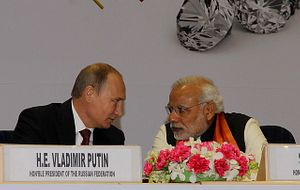When Russian President Vladimir Putin traveled to India last week for the annual Russia-India leaders’ summit, the leader of Crimea joined him. Sergey Aksyonov, a 42-year-old Russian nationalist, was elected in a closed session of the regional parliament after Russian forces annexed Crimea in February 2014. Aksyonov’s inclusion in Putin’s visiting delegation to India has drawn a reaction from the United States, which described Aksyonov’s participation as troubling. U.S. State Department spokeswoman Jen Psaki notes that “the Indian Ministry of External Affairs have said they were not officially aware of his visit or his participation in the delegation … We are seeking further clarification on that.” Psaki also signaled the United States’ general disapproval of the recent energy and defense deals signed between India and Russia, noting that the United States believed it was “not time for business as usual with Russia.”
Reuters notes that Aksyonov himself stated that his role in the Russia-India summit was limited to visits of “a private character,” and that he did not officially participate in any negotiations and or events. Aksyonov’s participation in the visit is a reminder that India refused to join international sanctions against Russia over its annexation of Crimea and continued support for anti-government rebels in Ukraine. Despite a growing relationship between the United States and India, the U.S. reaction to Aksyonov’s participation in Putin’s trip to India could emerge as an issue between the two countries. Following Indian Prime Minister Narendra Modi’s successful visit to the United States in September, India has invited U.S. President Barack Obama to New Delhi as the chief guest in India’s Republic Day celebrations in late January 2015 — an honor India reserves for few world leaders.
It remains to be seen how India might react to pressure from the United States regarding its relationship with Russia. Despite India’s ages-old foreign policy doctrine of non-alignment (which the new administration is increasingly looking to discard), India maintained close relations with Moscow both during the Cold War and afterward. Russia is generally New Delhi’s top arms supplier, supplying up to 75 percent of New Delhi’s defense hardware needs in certain years. Recently, however, Moscow was recently supplanted by the United States’ as India’s top defense supplier.
New Delhi may find itself having to take sides amid the growing geopolitical contest between Russia and the United States. After meeting with Putin, Modi himself remarked that India’s options when it came to defense parters “[had] increased.” Despite this, Modi assured Putin that Russia remains “our most important defense partner.”

































